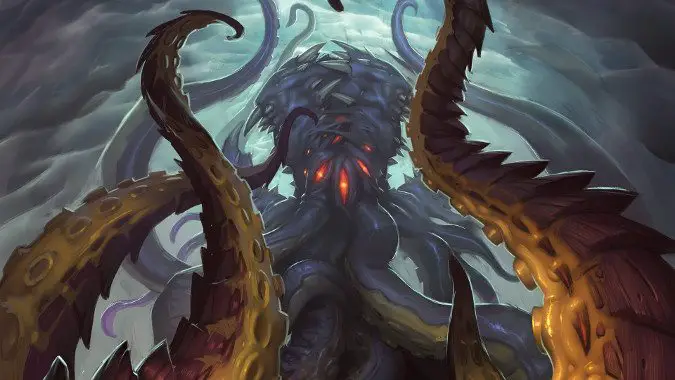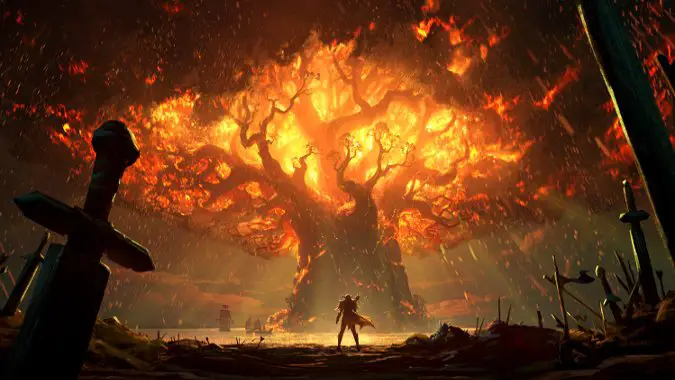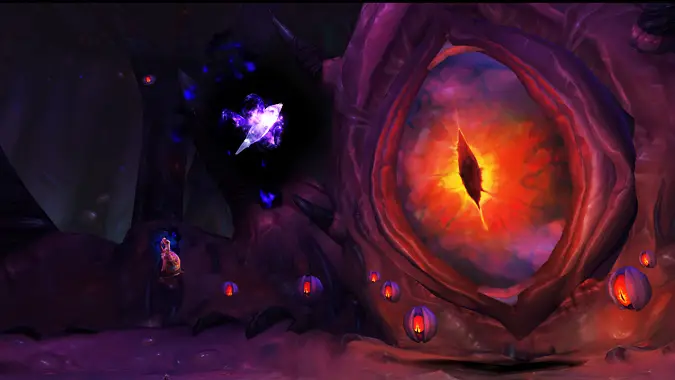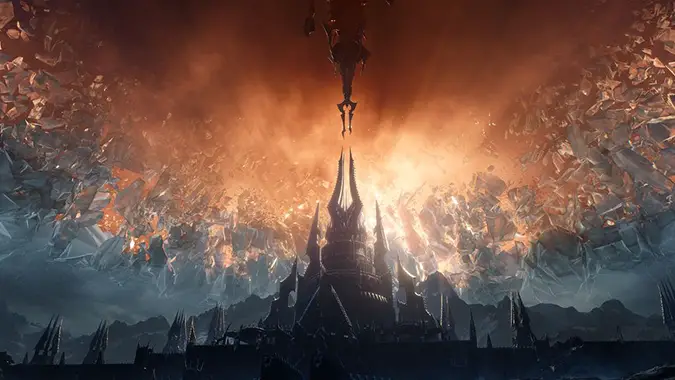Know Your Lore: Why N’Zoth didn’t start the Fourth War

Battle for Azeroth has certainly not been all things to all people. I think when looking back at the expansion, it’s fair to look at the story and gameplay elements of the expansion that didn’t work for us, with the understanding that no two people will have the same opinion of what elements did not work for them. For example, I disliked Azerite Armor and liked Warfronts. That’s the nature of a game as big as this one — looking back at Legion, I was never a fan of the legendaries. Trying to have Diablo‘s cake and eat it too with the three legendary system just did not work for me.
But when doing this work of interrogating the game, looking at what we feel was flawed and what could have been done better, we must be cautious. There is a difference between a qualitative issue and an issue of taste. It is possible, and even likely, for you to dislike something not because it is bad, but because it is not to your taste. Moreover, something can be extremely well done, even superlatively accomplished and simply leave you cold and disinterested. Making that thing simpler or more linear would not actually do anything to make it better — a streamlined narrative can be more effective, but it is not guaranteed to be.
I’ve read a lot of criticism of Battle for Azeroth, and I’ve made my own on a few occasions. It’s sort of my job. When I say I did not enjoy the Fourth War storyline — that it was not the game I wanted to play and it’s had lingering effects on my enjoyment of the expansion as a whole — believe me when I say I’m open to ways it could have been improved.
However, I’ve seen several people put forth the idea that it all should have been N’Zoth’s doing, that we should have been manipulated into fighting by the Old God from the start. I understand the appeal. It would have made the opening of the expansion thematically connected to the end, and it would have brought a sense of closure to the end raid. The bad guy who brought the whole world to war would have been defeated, the loose ends tied up.
But it also would have been way, way too easy.

The Fault Lies Not In Our Stars
The simple but effective message of Battle for Azeroth when taken on and examined is this — it’s not as simple as pointing to a big bad and saying this is your fault. We saw that before the expansion itself came out. The initial attack on Darkshore wasn’t a voluntary one for Horde players. Perhaps it should have been — we are, after all, playing heroes and exceptional people. It possibly should have been up to the individual players to decide if they were going to assist Saurfang’s plan to attack Darkshore. But in life we are often complicit in things we’re not fully aware of, and the entire Darkshore attack was laid out from start to finish as one where you observed the consequences of the Horde’s assault. You saw the villages infiltrated, the guards poisoned and assassinated, the forests as they burned.
For all that it was Sylvanas who gave the orders, but the assault on Darkshore couldn’t have happened without Saurfang and countless other members of the Horde. That’s the truth of war in general — those at the top bear special responsibility, but there’s culpability to go around for everyone who doesn’t take a stand against it. Just as we can’t just blame Sylvanas and call it a day, the story would have been fundamentally weaker if at the end N’Zoth had twirled a tentacle and said Haha I started that silly war to keep you busy.
It would have ceded responsibility away from mortal hands. N’Zoth took advantage, yes. So did Sylvanas, really — she and her patron on the other side of Death moved her into the role of Warchief when the Legion attacked, but they didn’t make the Legion attack. So did N’Zoth, from the Emerald Nightmare to now he’s been taking advantage of what’s been going on. They took advantage of what was happening already. That rings true to me — whenever there’s an existential crisis, there will be those who take advantage of the situation for their own aims instead of — or even at cross purposes to — a solution to the crisis. You need only look at a news site to see that in action a hundred times a day.
So having N’Zoth be responsible is too easy because it provides us with an escape clause. We can say see, this idiotic, genocidal conflict between factions isn’t the fault of the people in those factions, it’s the big scary tentacle god and go about our day. But it’s not N’Zoth’s fault that, the second the Legion was defeated, the Alliance and Horde started looking over at each other and drew their blades once again. They’ve been doing it for decades.

The Fault Lies in Ourselves
This doesn’t mean I believe that this message was always told in the best way possible, or even that I enjoyed playing a game that made me feel like I was surviving a genocidal conflict. I play World of Warcraft for the escapism and feeling of heroism, not to feel complicit in the extermination of thousands. But to evaluate the expansion through a critical lens, we have to look at what it aimed to do and whether or not it was successful in those aims as much as we do whether or not those aims dovetailed with what we wanted or were expecting. Another way to put this is that I often see people criticizing the expansion for not doing what they thought it would do, when it never said it was going to.
I personally wanted an end to the faction divide. A lot of us did. A lot of us felt like everything was leading that way. But at no point were we promised that — in fact, developers frequently quash the notion altogether. The understandable disappointment we may feel at the continuation of the factions as gameplay elements that prevent players from playing together doesn’t mean that the expansion has somehow failed as a story by not making that happen.
What I want is important — what every player wants is important — but there’s never ever going to be a game of this scale and scope that gives every player everything they want, because those goals are in some cases mutually exclusive.
Some players want the original talent system back. Some players, like me, would hate that. Those two groups do not have opinions you can wholly satisfy. This is the case for a hundred aspects of the game at any given moment, and it’s true for the story as well. It’s fair, even necessary, to criticize the story, to say This was unsatisfying to me, and here’s why. But when that criticism turns into calls to make the story less layered — to reduce complexity and make it simpler because then it would be a more self contained story — it needs to be tempered. World of Warcraft stopped telling self contained expansion stories in Warlords of Draenor. Storylines travel from expansion to expansion now — we’ve seen threads travel from one expansion to the next, and in a very real way Shadowlands is the culmination of threads from Warlords, from Legion, and from Battle for Azeroth.

How do we judge multi-chapter storytelling?
One thing that we see in Battle for Azeroth is storytelling that is perfectly aware that it is episodic in nature, and that it is being told not just across patches, but across expansions as well. The Ny’alotha raid is full of call-backs to previous expansions, previous raids, and previous encounters going all the way back to original World of Warcraft and the Ahn’Qiraj raids, including encounters from Cataclysm, Legion and more. N’Zoth as a threat neither started with Battle for Azeroth nor concludes with it — everything we’re told about Ny’alotha indicates that it is not an actual, physical place but rather an idea attempting to become manifest, a delusion trying to get us to dream it.
This is related to the entire Fourth War, because that war is itself our fault. We are complicit in it. It is the dream we have been dreaming since World of Warcraft started: the shared delusion of both factions that their squabble matters, that the war needs to be fought. Attempting to put that war in N’Zoth’s hands excuses us, and I think that’s a mistake. It’s telling that in confronting N’Zoth, we are offered a shared future — the Old God even states that only he can save us from what’s coming. This is tempting is because we are ultimately under the opinion that we cannot stop fighting each other. We cannot save ourselves from ourselves.
To cast N’Zoth as the cause of all our problems would be to steal the narrative thread connecting Shadowlands to these previous expansions. In the rise of Death, we’ll finally have to confront what we want life to become. The story of Battle for Azeroth cannot be viewed on its own — it is dependent upon what came before it, and will impart meaning to what comes after. Trying too assiduously to tie up all the loose ends would rob us of that narrative thread between expansions, and rob them of their shared power.
Please consider supporting our Patreon!
Join the Discussion
Blizzard Watch is a safe space for all readers. By leaving comments on this site you agree to follow our commenting and community guidelines.
 @MatthewWRossi
@MatthewWRossi




